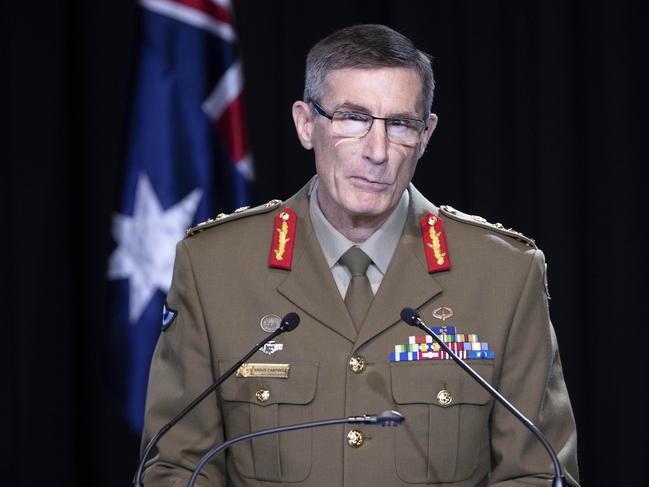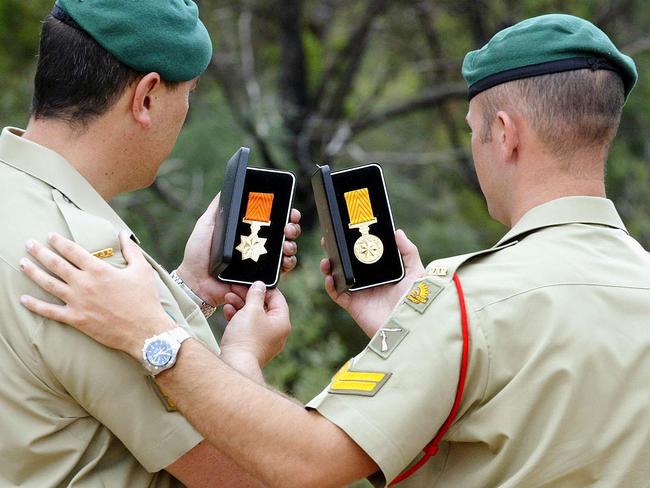Australian war crimes inquiry: 3000 soldiers face losing their medals
In a devastating blow, as many as 3000 troops face losing their medals following the disturbing findings of the Australian war crimes inquiry.
National
Don't miss out on the headlines from National. Followed categories will be added to My News.
Despite the clear “courage and commitment” of the majority of soldiers within the Special Operations Task Group, as many as 3000 soldiers could lose their Meritorious Unit Citation.
This will come as a devastating blow to many innocent members of Special Forces who wear all medals from combat with pride of national service but ADF chief General Angus Campbell said it was a “collective”.
There was evidence there was no longer “sustained outstanding service” as required by the citation wording, throughout their service in question 2005 to 2016. This was particularly the case in 2 Squadron Special Air Service Regiment.
“It has to be said that what this report discloses is disgraceful and a profound betrayal of the Australian Defence Force’s professional standards and expectations. It is not meritorious,” it concludes in relation to SOTG.
“The inquiry has recommended the revocation of the award of the Meritorious Unit Citation, as an effective demonstration of the collective responsibility and accountability of the Special Operations Task Group as a whole for those events.”

Between 2005 to 2016, the period within the Brereton investigation remit, more than 26,000 Australians served in Afghanistan, up to 3000 of them in the Special Operations Task Group, who will now lose their citations.
The cancellation of individual awards including gallantry, valour and distinguished service will be determined on a case-by-case basis as individuals are dealt with through criminal or disciplinary actions.
“However, it is difficult to see how any commander at the Special Operations Task Group, Squadron or Troop level, under whose command or ‘on whose watch’ any substantiated incident referred to in this report occurred, could in good conscience retain a distinguished service award in respect of that command,” it summarised.
The inquiry recommended those medals be reviewed and has already recommended certain individuals from certain units and deployment rotations be stripped of them although the identity of those men has been redacted.
Military lawyer and former army officer Glenn Kolomeitz, who served in East Timor and Afghanistan, said while the findings were scathing the decision failed to take into account the innocent and families of deceased soldiers awarded the citation.
Mr Kolomeitz joined the army in 1986 before he worked as a legal officer and served on operations in Afghanistan with the Special Operations Task Group in 2009 to 2010.
“You need to bear in mind a lot of guys who fought in the Battle of Shawali Kowt got the award and haven’t been involved in these alleged killings,” he said.

“Also, what about the families of the fallen? Are we going to take the medals of their dead family member who was in the Special Forces?
“How about those in senior leadership hand their distinguished service bands. They only got it because of their ‘leadership’ and this inquiry is about the breakdown in their leadership.”
For many veterans the inquiry was a “long time coming” and had expected it to be significant, but like many Australians have been left shocked by the “sheer quantum” of the serious allegations.
“It’s a bit of a load off many peoples’ shoulders, but at the same time it’s added stress all because of the findings and recommendations,” Mr Kolomeitz said.
“The reaction so far is the issue has been resolved and change is coming and at the same time a bit more trauma added on other special forces soldiers who witnessed the incidents but weren’t necessarily involved in anything.”
Chief of Army General Rick Burr was on Thursday with the SASR in Perth as the report was made public. He did not comment on the medals issue with the more pressing fallout for those around him being the removal of 2 Squadron.
“This action reflects no judgment on the current members of 2 Squadron, Special Air Service Regiment, but we all must accept the wrongdoings of the past,” he said.
“Current members of the squadron will be reassigned to other sub-units within the Regiment.
A deliberate implementation plan will be developed to support this. As the Chief of Army this is not a decision I have taken lightly.”
The gap in the numbering system would be a permanent reminder of this blight.
He said both decisions made sent a clear message about the shocking nature and how it would be perceived.
“This is a challenging time for us all. Our Army must learn, improve, support each other and together we will get through this,” he said.
Mr Kolomeitz warns while the confronting and damning report will bring “sweeping changes” to the special forces, he isn’t confident there will be any changes made to the Australian Defence Force.
“We have had inquiry after inquiry into things like the abuse in the ADF and maladministration. They always say this will never happen again, but a few years later there’s a new inquiry,” he said.
“There’s also a group being overlooked in all this – the enablers. The legal officers whose job was to go on operations have oversight on the compliance and provide a layer of deterrence to ensure nothing is done illegal.
“Where are they mentioned in all this? It’s like they become in awe of the special forces and lose their objectivity. During my rotation I knew there was a job to do, stay objective and protect the integrity of operations.”
Support services:
The Defence all-hours Support Line is a confidential telephone and online service for ADF members and their families 1800 628 036
Open Arms provides 24-hour free and confidential counselling and support for current and former ADF members and their families 1800 011 046, or through SafeZone on 1800 142 072.
Crisis support from Lifeline is available on 13 11 14
MORE NEWS
Shock detail of troops’ alleged killings revealed
Disturbing war crimes report: What happens next
Actions of few endangering others
Five words Australia’s military must use right now
War hero’s army squadron disbanded
‘Lies told’: Defence Force chief’s speech stuns
Originally published as Australian war crimes inquiry: 3000 soldiers face losing their medals


